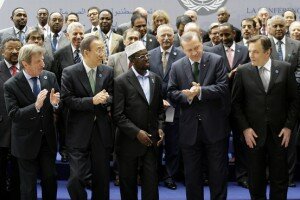Africa Dispatch: Somalia’s Money Men

ISTANBUL—At this swanky conference on Somalia over the weekend, the most important guests didn’t hold lofty posts. At least one lacked a college degree. But they represent some of the most powerful—and moneyed—players in Somalia: its business leaders.
The United Nations hosted the Conference on Somalia, and it was predictably high-class. Participants gathered in marbled five-star hotels scattered across the city, all with breathtaking views of the Bosphorus, the strait that divides Asia and Europe. They chatted about Somalia’s problems over hot and cold Turkish dishes and at least a half-dozen types of dessert.
At the conference, there were the usual participants—Western, Arab and African diplomats, United Nations officials and of course the Somali government. This time, however, a different sort of guest also was invited.
The nearly 60 suit-clad business executives that showed are a tight-knit group formed amid Somalia’s conflict. Their attendance underscored how robust Somalia’s private sector has become, and the special role they play in nudging the war-wracked country closer to stability.
These are the quintessential entrepreneurs. They have survived Somalia’s violence and often thrived in its free-for-all market. Somalia has no taxes, no regulation and clan governance. In that environment, businesses have stepped in to sustain Somalis’ way of life, offering mobile phone service, money-transfer operations and banking. Several have reaped remarkable profits.
Officials from the United Nations and the African Union went out of their way to note the contributions the private sector has made to Somalia. At a UN-hosted luncheon over the weekend, one official told participants that it’s business people, not politicians, who get things done. He was rewarded with nods and appreciative laughter.
The private sector is skeptical of this administration, considered by the international community to be the first viable option in 20 years. Most businessmen laughed when asked their views on the government.
“Government?” one asked. “What government?”
Despite the overt attention paid to this nascent commercial sector, the two sides remained largely divided at the conference. President Sheikh Sharif Sheikh Ahmed huddled with top officials from the United Nations, African Union and the Organization of the Islamic Conference. Meanwhile, businessmen met several streets away, at another hotel, to discuss their own concerns.
Financial goals differed sharply as well. Mr. Sharif wants to persuade foreign donors to keep funding his administration so he can ward off insurgents. The private sector wanted to create an environment to improve revenue and generate greater profits. Executives discussed electricity and internet access. Each industry said they hoped to establish associations to impose regulations to help them meet international standards, and, they hope, pique the interest of foreign investors.
Business leaders complain that the government has asked them to pay taxes without offering the regulation or the security they need to grow their businesses. Government officials say they value the private sector’s role. They tried to dissuade the tension, sending representatives to meet with the business leaders at the conference.
For now, business leaders seem to have adopted a wait-and-see attitude toward the government. “We’ve lived 20 years without a government,” said Omar Jama Hashi, a member of the Somali International Chamber of Commerce and Industry. “We can survive another 20 more.”
By SARAH CHILDRESS
—————–
Source:-WJ.com
Comments
comments
 Calendar
Calendar




































